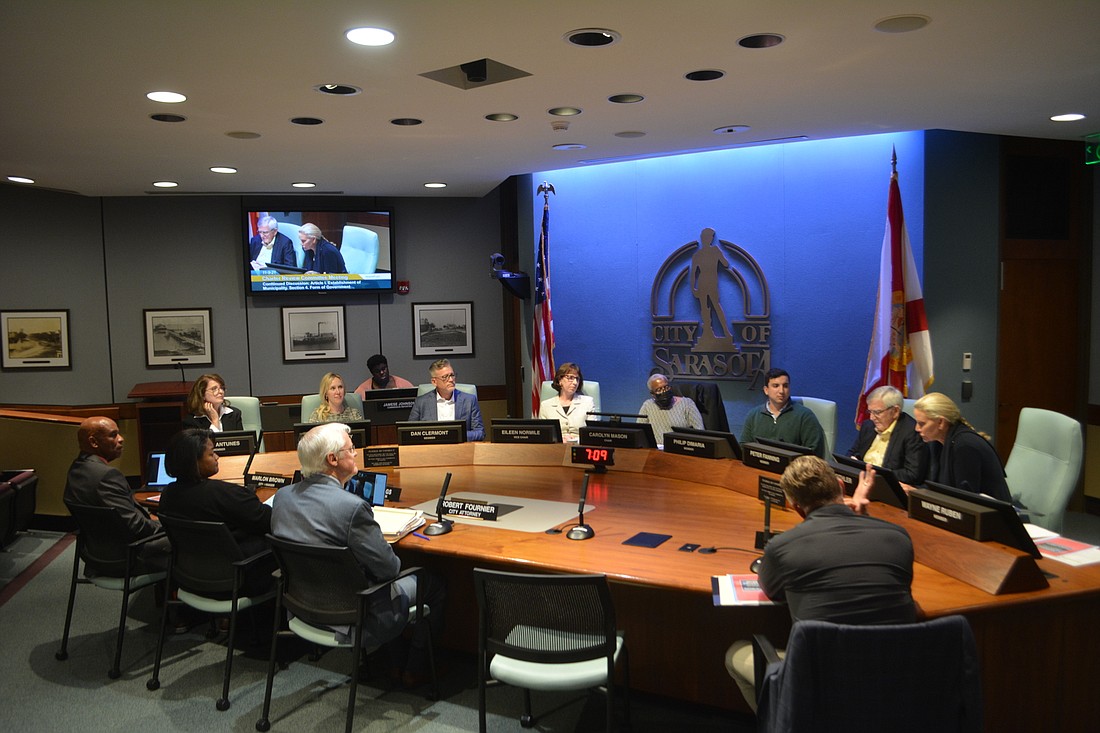- April 22, 2024
-
-
Loading

Loading

Though there was some concern about the potential viability of minority candidates in a citywide race, the Sarasota Charter Review Committee moves into 2022 with a proposal recommending an elected mayor who would serve for four years.
The 10-member board, which has been at work since August considering potential alterations to the city’s foundational governing document, voted 7-3 in December to advance the new form of city government.
That notion, and any others approved by the board, will be presented to the City Commission in March for ballot consideration. Any, all, or none could reach city voters as part of the Nov. 8, 2022 general election, which will include City Commission races. The charter review process is an every-10-years event, required by state law. Members of the board were chosen last summer by the City Commission.
The proposal approved by the board on Dec. 20 calls for a five-person City Commission consisting of three district-elected commissioners, one at-large commissioner and an at-large mayor, who has voting powers but no veto or other administrative powers or duties. In conversations leading up to the vote, stronger forms of mayor were considered but ultimately rejected.
The city’s mayor under the current form of government serves with the title for a year and is selected by fellow commissioners, not directly by the voters. Mayor Erik Arroyo was selected to begin his 2021-22 term with the title Nov. 5.
“The election system is still the same,’’ said board member Dan Clermont, who voted with the majority. “And the city is electing that person, choosing that person, for four years as opposed to the commission. So when you’re making a commitment of four years, I’d like to see the voters do it.’’
Also supporting the change were Crystal Bailey, Philip DiMaria, Peter Fanning, Kim Githler, Wayne Ruben, Jeff Jackson. Voting against were Eileen Normille, Carolyn Mason, Cathy Antunes.
Antunes said she didn’t support the proposal, saying she was concerned about the ability of minority candidates to gain a foothold in a citywide election.
“We’re a richer city because we’ve had the mayors I’ve talked about,’’ she said. Mayor Shaw, Mayor Shelli Freeland Eddie. They are all from the single-member districts.’’
DiMaria said the changing nature of the city’s demographics would likely open opportunities for a wider range of viable mayoral candidates than was possible in years past.
“Anyone who’s elected at-large is more so a reflection of the community,’’ he said. “As Sarasota becomes younger and more diverse, we’re going to see different folks elected.”
City Attorney Robert Fournier said potential mayoral candidates would state their intention to run for the city’s highest elected office, and it would not be permissible for a candidate to attempt a run for commission at the same time.
“We’re going to delete running in a single election for at-large and split it into two separate elections,’’ he said.
As part of the discussion of the elected mayor and a separate item for consideration, committee members considered pay for the new position and a revamping of the pay for commissioners. They agreed to push forward by upping commissioner pay from $29,500 to $40,000 annually, with a 2% increase each year. The mayor would be paid $45,000.
Normille, who voted against the proposal, has expressed skepticism about attracting qualified candidates. She compared the election of a mayor to the vetting of a professional staff member such as City Manager Marlon Brown.
“Again, my concern is that when you bring in a city manager like Mr. Brown, you have documentation about his ability to do the job. And you hopefully hire the best person that you can hire. And if he doesn’t hold up in the end, you can fire him, the commission can fire him. “An elected mayor only has to live in the city for year. That’s it. If he’s a four-year guy, what would we be electing him based on?”
Should the panel’s recommendations on changing the form of city government reach the voters, such a proposal doesn’t have a winning track record.
Between 1996 and 2009, city voters rejected three separate referendums seeking to create an elected mayor position with varying levels of power. At the beginning of their deliberations, committee members who favored the current council-manager system cited past opposition and said they did not believe there was a compelling reason to significantly adjust the city’s current system of governance.